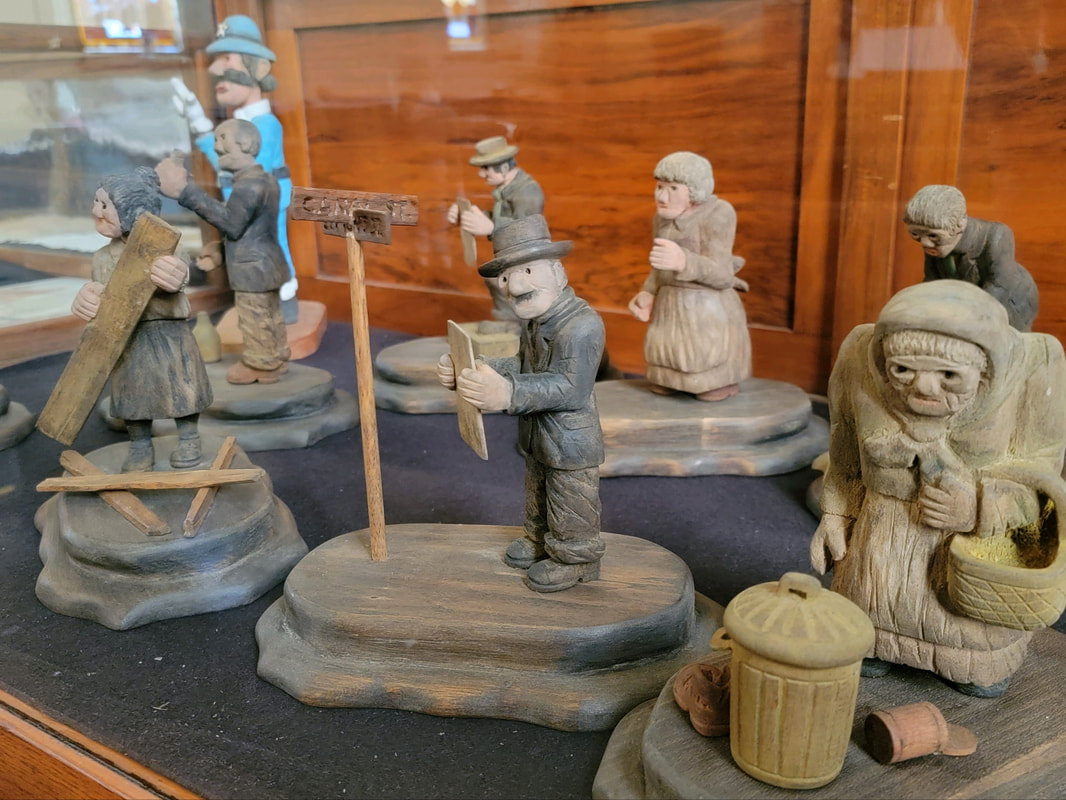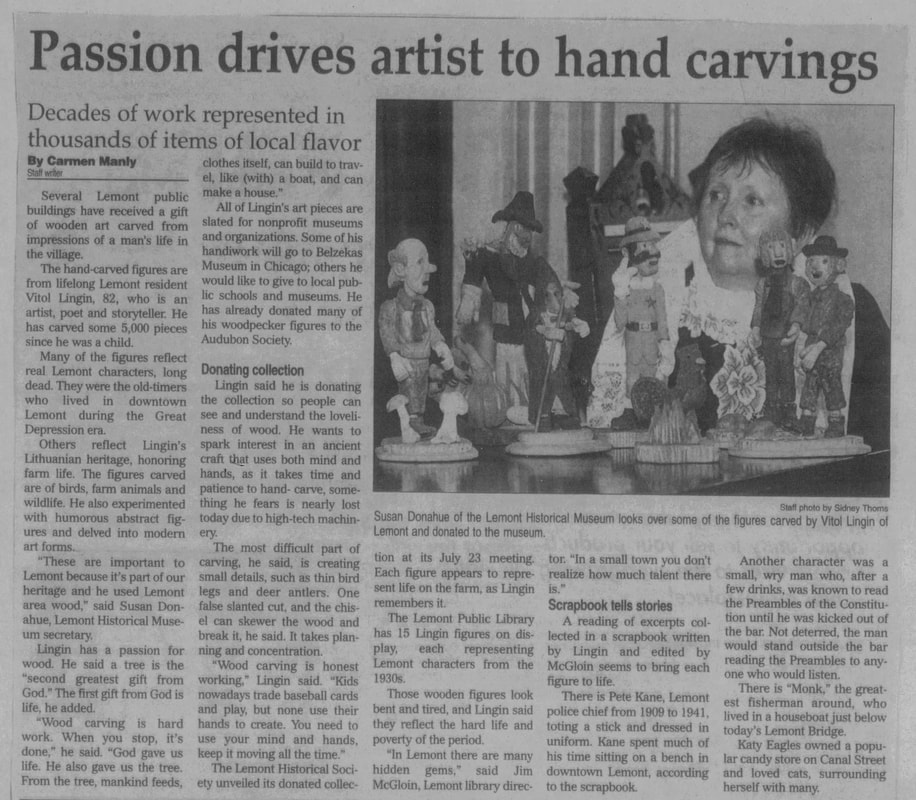During July, members of the Lemont Area Historical Society created an exhibit on the main floor of the Old Stone Church so that it would be handicapped accessible. Looking at our collections we decided to concentrate on just three local artists. Gathering information from Newspapers.com we wrote three short biographies of the artists. Recently, LAHA had shared over 100 microfilm local newspaper rolls with Newspapers.com.
|
Vitol J Lingin
Vitol J Lingin (1919-2003). Vitol’s parents were born in Lithuania and moved to Lemont where his father Mathew owned a shoe and harness repair shop. Vitol had a passion for wood and felt “Wood is the second greatest gift from God; the first gift from God is life”. He carved over 5,000 figures which he gave to various charities and organizations. Many of the figures are of Lemont old-timers who lived during the Great Depression. These are important to Lemont because they are part of our heritage and even the wood he used came from Lemont. One example of this is Lemont’s former Chief of Police (1909-1941) Pete Kane. |
Vitol Lingin donates his life's works to several Lemont organizations.
This moment was capture by the Lemont Met/Reporter on Aug 1, 2002. See below to view the article.
Woodcarver Vitol Lingin wrote these stories for his sculptures
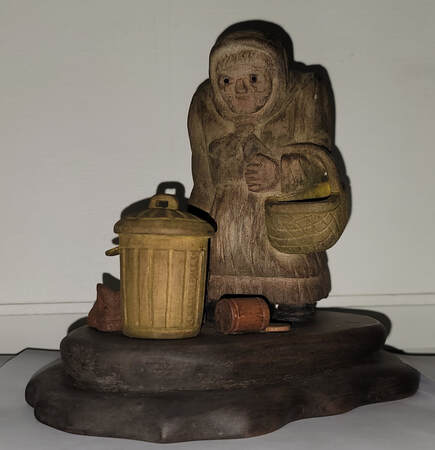
ANASTASIA
She was a short, stocky woman in her late sixties. She wore a dark black dress that came down to her
ankles, and an apron that once was blue now faded to a near white. Her head was covered with a babushka and her hair stuck out wildly in all directions, almost covering her puffed up cheeks. Her grin revealed missing front teeth. Her general appearance was very shoddy and uncouth. Her big shoes were mismatched and ugly. She carried a basket on her left arm.
Her body was bent over as she shuffled along walking. Her eyes looked down as she made her way down
the alley, going from one garbage can to another, examining the contents of each to find something of value that she could use. Her values were very meager. She would take anything and everything imaginable, put in her basket and take it home. Day after day, she wold make her way through the alleys of Lemont looking for junk and plain garbage that was thrown away.
Sometime people would hire her to do their wash. After she was done with the people’s wash, she would take off her dress and apron and wash them, wring them out, dry them and put them back on. After years of collecting and going down alleys and taking all that garbage home, then wrapping it and tying it up in newspapers, her home became unlivable.
She was found dead among her collectibles; and so another life passed on to the Great Beyond.
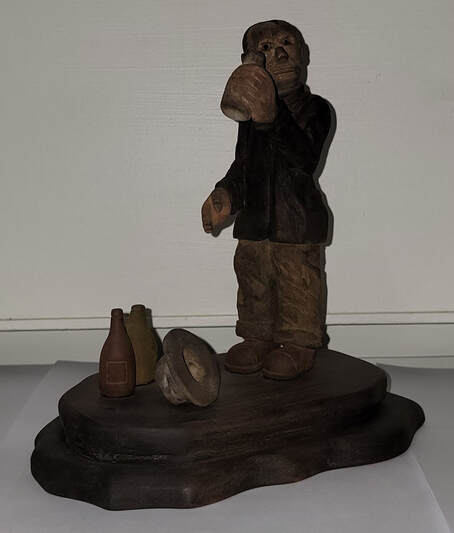
BIG EMMETT
He was a bull of a big man who walked the town in defiance of his surroundings. He covered his
body with the usual clothing of the times, black coat and brown pants and the working man’s blue
shirt, and heavy depression shoes of an unknown color. He was a moving energy of a man with a pug nose and thinning hair. He had one ambition, to drink all the whisky produced during prohibition.
In the early working years, he was a meat packing inspector who knew thoroughly the quality of the animals we use for food. When shopping at local meat and grocery stores, he constantly argued about the price and quality of the meat. He also would fight in one of the many taverns that existed in the village.
One time, he was sitting in Losey’s and Wold’s pool room, in front of one of the pool tables, when a player miscued and sent the break ball off the table and it hit Big Emmet in the head. All was forgiven when the player bought him a drink. One time, in the same pool room, he got into a fight with Losey who was a very small man, but Losey hit him and kicked him out of the back door onto the ground where there had been a lot of broken glass. The result he got many cuts and lost a lot of blood. Another time, going up Singer Hill at night, he was hit by a car. His only worry was about the broken half-pint bottle in his hip pocket. All was well when he received a new bottle of whisky.
Once he got into a fight with a man named Johnson, on Main and Stephen Streets. He was so drunk he could just about stand. When he swung with his massive fist, his opponent could tie his show laces before he ducked. Luckily, Johnson was also drunk and the surrounding air took the
beating. And, so another man fulfilled his destiny.
He was a bull of a big man who walked the town in defiance of his surroundings. He covered his
body with the usual clothing of the times, black coat and brown pants and the working man’s blue
shirt, and heavy depression shoes of an unknown color. He was a moving energy of a man with a pug nose and thinning hair. He had one ambition, to drink all the whisky produced during prohibition.
In the early working years, he was a meat packing inspector who knew thoroughly the quality of the animals we use for food. When shopping at local meat and grocery stores, he constantly argued about the price and quality of the meat. He also would fight in one of the many taverns that existed in the village.
One time, he was sitting in Losey’s and Wold’s pool room, in front of one of the pool tables, when a player miscued and sent the break ball off the table and it hit Big Emmet in the head. All was forgiven when the player bought him a drink. One time, in the same pool room, he got into a fight with Losey who was a very small man, but Losey hit him and kicked him out of the back door onto the ground where there had been a lot of broken glass. The result he got many cuts and lost a lot of blood. Another time, going up Singer Hill at night, he was hit by a car. His only worry was about the broken half-pint bottle in his hip pocket. All was well when he received a new bottle of whisky.
Once he got into a fight with a man named Johnson, on Main and Stephen Streets. He was so drunk he could just about stand. When he swung with his massive fist, his opponent could tie his show laces before he ducked. Luckily, Johnson was also drunk and the surrounding air took the
beating. And, so another man fulfilled his destiny.
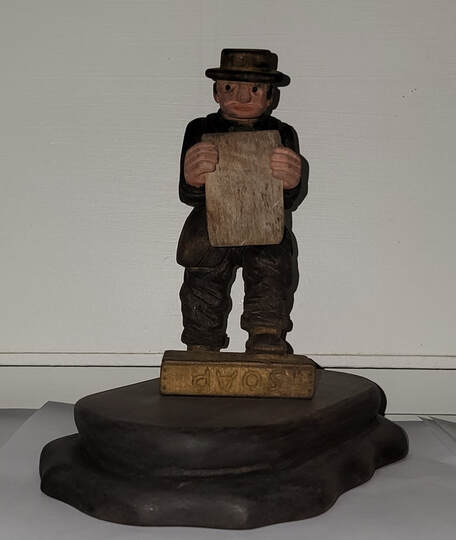
CASEY JONES
There was a small, wirey man who, after a few drinks would start off reciting the Preamble of the Constitution and the Bill of Rights. He always wore a hard, round, white straw hat. He would go to a saloon and, after a few drinks, would start preaching his rights until they got tired of him and threw him out. Then he would stand in front of the saloon for hours speaking about the Constitution. He was the forerunner of today’s protester, very much ahead of his time.
Picture him standing on an overturned soap box, taking his katie straw hat off, occasionally to mop the sweat off his brow, exposing his Irish red hair. He would talk to anyone who would listen about his rights. This habit would occur daily and his voice is even heard today in thou-sands of other people across this land.
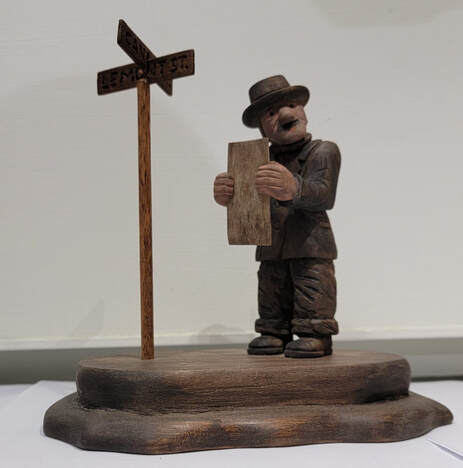
ME BOSS SHMIDO
He showed up in Lemont in the early 1900’s, coming from Jugoslavia, looking for work in the quarries. The stone business was over and work was hard to find.
He lived in a rundown hotel on the end of Canal Street operated by Mrs. Bozick. She carried her money in a glove on her chest. As the years went by, he earned his living doing odd jobs and cleaning yards, basements and painting buildings, always working for a few nickels. When old age crept up, he would never accept a job from anyone unless he was the boss. He would say in very broken English: “Me Boss, OK I work; Me no boss, me no work,” and became known as “ME BOSS SHMIDO”.
He was a little guy dressed in a suit coat and pants and wore a hat. He had a moustache and was jolly and spry. He could not read nor write, but he carried a newspaper under his arm and sometimes pretended to be reading it.
He had very rich relatives in Europe and they left him a huge fortune. It was rumored that if he went back to Jugoslavia he could claim it. He refused and continued living his pauper existence to the end of his days.
He showed up in Lemont in the early 1900’s, coming from Jugoslavia, looking for work in the quarries. The stone business was over and work was hard to find.
He lived in a rundown hotel on the end of Canal Street operated by Mrs. Bozick. She carried her money in a glove on her chest. As the years went by, he earned his living doing odd jobs and cleaning yards, basements and painting buildings, always working for a few nickels. When old age crept up, he would never accept a job from anyone unless he was the boss. He would say in very broken English: “Me Boss, OK I work; Me no boss, me no work,” and became known as “ME BOSS SHMIDO”.
He was a little guy dressed in a suit coat and pants and wore a hat. He had a moustache and was jolly and spry. He could not read nor write, but he carried a newspaper under his arm and sometimes pretended to be reading it.
He had very rich relatives in Europe and they left him a huge fortune. It was rumored that if he went back to Jugoslavia he could claim it. He refused and continued living his pauper existence to the end of his days.
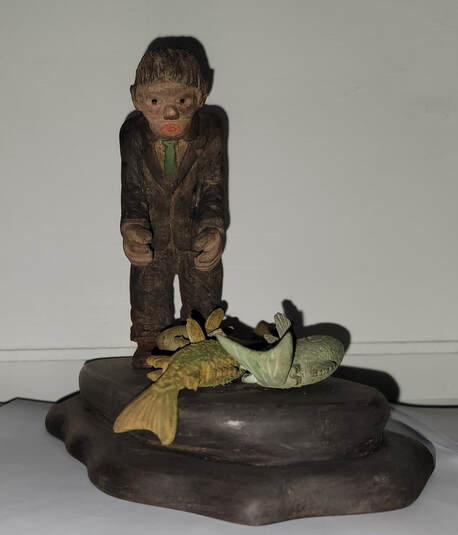
MONK
He was Lemont’s greatest fisherman. He lived in a boat house moored on the stone banks of the Des Plaines River, off the Lemont Road bridge. He fished the river for over 60 years and never worked a day in his life. A few drinks and a carp to eat was a full life for him.
He made a few cents selling bullheads and carp to anyone who wanted to buy. Monk fished many ways.
One way was to have a spear on the end of a very long bamboo fishing pole. On a very hot July day, when the fish would lay belly-up on top of the water, he would spear them. In the shallow waters below the dam was his best place.
One time, on a hot summer day in August, a group of young lads came up to his boat house with a large German Shepherd dog. Monk insisted on giving the big dog a bath in the river. He had been
celebrating, who knows what, and drinking. He grabbed the big dog by the neck, lifting him high in the air, to throw him into the water. Lo and behold, the dog dropped to the ground and Monk went in the Des Plaines River for his weekly bath and it wasn’t even Saturday. Monk came out spitting and cursing, but it ended in laughter.
He was Lemont’s greatest fisherman. He lived in a boat house moored on the stone banks of the Des Plaines River, off the Lemont Road bridge. He fished the river for over 60 years and never worked a day in his life. A few drinks and a carp to eat was a full life for him.
He made a few cents selling bullheads and carp to anyone who wanted to buy. Monk fished many ways.
One way was to have a spear on the end of a very long bamboo fishing pole. On a very hot July day, when the fish would lay belly-up on top of the water, he would spear them. In the shallow waters below the dam was his best place.
One time, on a hot summer day in August, a group of young lads came up to his boat house with a large German Shepherd dog. Monk insisted on giving the big dog a bath in the river. He had been
celebrating, who knows what, and drinking. He grabbed the big dog by the neck, lifting him high in the air, to throw him into the water. Lo and behold, the dog dropped to the ground and Monk went in the Des Plaines River for his weekly bath and it wasn’t even Saturday. Monk came out spitting and cursing, but it ended in laughter.
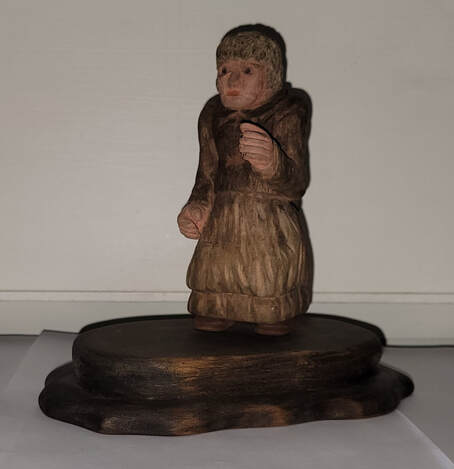
MRS. HISS
She lived on Main Street, next to Budnik’s Drug Store, in a small, two-story building. She owned and ran a candy store. When you would open the front door, you would hear the tinkle-tinkle of the wind bells as they hit the door.
She was a very small, frail woman who used a cane to get around. She had gray hair with a bun on top and walked very stooped over. On her ears, she wore shiny, sparkling earrings. Her dress was always the color black, and sometimes she wore a white collar with the black dress. She wore small oval gold glasses. She spoke with a squeaky voice. She sold all kinds of penny candy. The candy counter had a half-curved top.
It shined and sparkled as you looked through it at the candy. She always spoke with a very low voice and was very polite. She was of French descent.
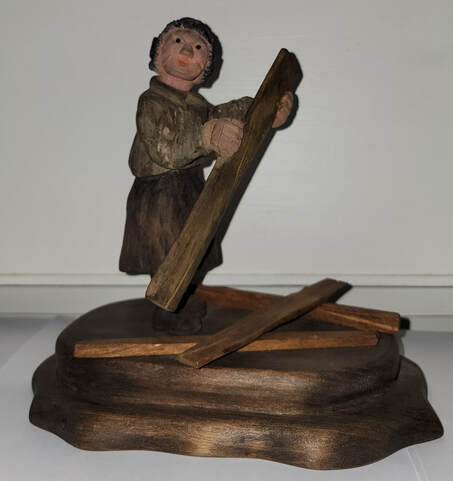
PAULINA
She was an old woman who lived on the banks of the old Illinois-Michigan Canal and River Road, at the bottom of Singer Hill, where a little bridge crossed the canal.
She was a skinny, rather spry person. She wore a skirt that came down halfway between the knees and the ground. The apparel she wore was mostly shabby and black, and the coat was of the 1800 vintage. On her head was an old fedora felt hat and the brim was pulled down over her face. Her shoes were big and mannish and dirtied with mud.
The shack house she lived in was colored lime green and the paint was peeling. The fence was about six feet high; and, in some places, it measured one foot to three feet thick. It had everything from orange and apple boxes to railroad ties nailed to it. Every day, Pauline would go around the canal area and look for boards to nail to her fence. In some areas she nailed corrugated tin sheets. The overall picture – Pauline had created a FORT.
She had been doing this for many years. When you would go by, she would be peeking out of one of the crevices. The kids who would go by would holler “Lena, Lena, the old woman who lives in a Fort”!
She was an old woman who lived on the banks of the old Illinois-Michigan Canal and River Road, at the bottom of Singer Hill, where a little bridge crossed the canal.
She was a skinny, rather spry person. She wore a skirt that came down halfway between the knees and the ground. The apparel she wore was mostly shabby and black, and the coat was of the 1800 vintage. On her head was an old fedora felt hat and the brim was pulled down over her face. Her shoes were big and mannish and dirtied with mud.
The shack house she lived in was colored lime green and the paint was peeling. The fence was about six feet high; and, in some places, it measured one foot to three feet thick. It had everything from orange and apple boxes to railroad ties nailed to it. Every day, Pauline would go around the canal area and look for boards to nail to her fence. In some areas she nailed corrugated tin sheets. The overall picture – Pauline had created a FORT.
She had been doing this for many years. When you would go by, she would be peeking out of one of the crevices. The kids who would go by would holler “Lena, Lena, the old woman who lives in a Fort”!
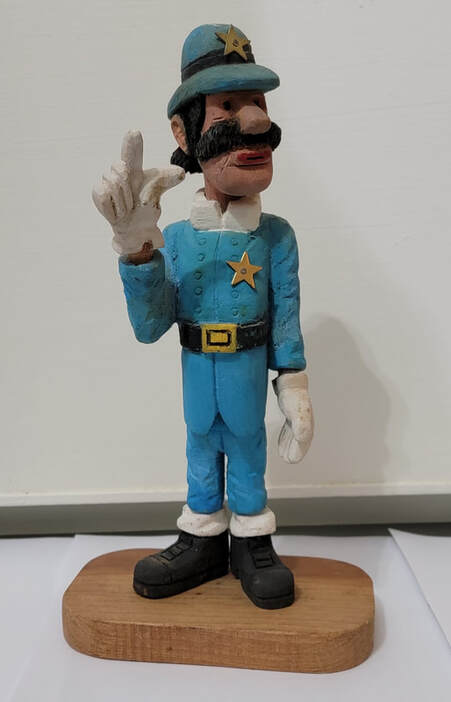
PETE KANE
He was the town policeman, protector and law man. He was dressed in a plain dark navy blue uniform and his coat came down low on his hips. He was a very tall, straight, thin man, holding his head very erect. He had a plain five-point star on his left side and carried a gun under his long coat which was unnoticed by anyone. In the summer, he wore a striped blue shirt with yellowish-green suspenders.
He came to work in the morning when the sun was climbing high in the sky and would sit on a bench in front of a tavern. In those days, all of the taverns, 26 of them, would have a bench in front of their business. As the sun rose higher in the sky, he would move down the line to the next tavern bench, and so on, until the afternoon sun started its journey to set and the 6 o’clock bells of the churches started to ring. He would go up and down the streets, shaking hands with the door knobs of the stores, to see if everything was closed up. Then, he would head up the hill for home. He repeated the same ritual day after day.
The Village of Lemont owed him so much back pay they could never fire him. It was rumored that he cornered a crook in Rubber’s Tavern and had a shoot-out with him. I never knew all of the details, but after that he never carried a gun. Life was pure and simple in those days, with plain people obeying the laws of God and man.
He was the town policeman, protector and law man. He was dressed in a plain dark navy blue uniform and his coat came down low on his hips. He was a very tall, straight, thin man, holding his head very erect. He had a plain five-point star on his left side and carried a gun under his long coat which was unnoticed by anyone. In the summer, he wore a striped blue shirt with yellowish-green suspenders.
He came to work in the morning when the sun was climbing high in the sky and would sit on a bench in front of a tavern. In those days, all of the taverns, 26 of them, would have a bench in front of their business. As the sun rose higher in the sky, he would move down the line to the next tavern bench, and so on, until the afternoon sun started its journey to set and the 6 o’clock bells of the churches started to ring. He would go up and down the streets, shaking hands with the door knobs of the stores, to see if everything was closed up. Then, he would head up the hill for home. He repeated the same ritual day after day.
The Village of Lemont owed him so much back pay they could never fire him. It was rumored that he cornered a crook in Rubber’s Tavern and had a shoot-out with him. I never knew all of the details, but after that he never carried a gun. Life was pure and simple in those days, with plain people obeying the laws of God and man.
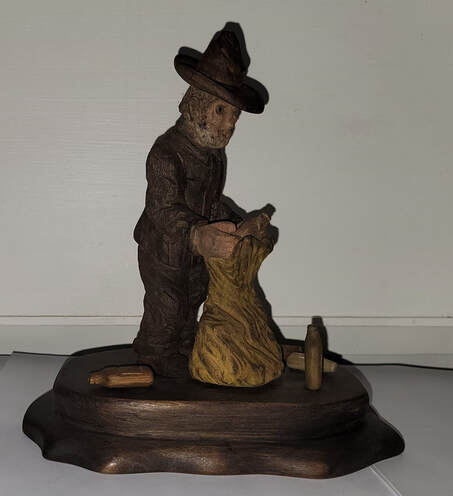
SPARKY STARKS
He was an old man with a big white beard who carried a gunny sack over his shoulder. On his head, he had an oversize felt hat that ballooned out and looked like it came from the West. His clothes
and coat with his baggy shoes always seemed too big for him, especially the hat.
His goal in life was going down alleys and streets looking for pint and half-pint bottles, which he traded to bootleg whisky dealers for alcohol. The streets were always clean of bottles.
He slept in a shed behind a tavern on Main Street, which also had a restaurant. The cook, a greasy-looking character, but who had a heart of gold, would feed him.
In time, magic disappears, beyond who knows?
He was an old man with a big white beard who carried a gunny sack over his shoulder. On his head, he had an oversize felt hat that ballooned out and looked like it came from the West. His clothes
and coat with his baggy shoes always seemed too big for him, especially the hat.
His goal in life was going down alleys and streets looking for pint and half-pint bottles, which he traded to bootleg whisky dealers for alcohol. The streets were always clean of bottles.
He slept in a shed behind a tavern on Main Street, which also had a restaurant. The cook, a greasy-looking character, but who had a heart of gold, would feed him.
In time, magic disappears, beyond who knows?

